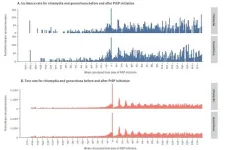(Press-News.org) A team led by researchers at Weill Cornell Medicine has identified important drivers of the transformation of a type of blood cancer called follicular lymphoma from a slow-growing form to the aggressive form it takes in some patients.
The study, published March 7 in Cancer Cell, showed that while mutations affecting a gene-regulating complex called BAF can put the cancer on a dangerous trajectory, they also make follicular lymphoma highly susceptible to experimental BAF-inhibitor drugs.
“These encouraging findings could address critical and urgent challenges with this disease and have prompted us to begin planning clinical trials of BAF inhibitors in follicular lymphoma patients,” said study senior author Dr. Ari Melnick, the Gebroe Family Professor of Hematology/Oncology and a member of the Sandra and Edward Meyer Cancer Center at Weill Cornell Medicine.
The study’s co-first authors were postdoctoral researchers Dr. Darko Barisic and Dr. Christopher Chin, and senior research associate Dr. Cem Meydan, all members of the Melnick laboratory. A team led by Dr. Michael Green, an associate professor at the University of Texas MD Anderson Cancer Center, also collaborated in the study, and published a paper with parallel findings.
Follicular lymphoma is the second most common type of lymphoma in the United States, with about 15,000 new cases per year, according to the Lymphoma Research Foundation. Like most lymphomas, it arises from immune cells called B cells. Usually, follicular lymphoma progresses slowly, and remains manageable with various treatments. But a subset of these patients rapidly progress to a transformed, rapidly dividing, and treatment-resistant form of follicular lymphoma within 24 months. The reason for this is unknown, and hence it is very hard to predict if a patient is at risk for this unfavorable outcome. Thus, there is a critical unmet need to identify and develop early intervention therapies for these cases.
In the study, researchers started out by examining the role of mutations in a gene called ARID1A, which encodes a subunit of a versatile, multi-protein molecular machine called BAF. The BAF machinery normally works in cells as a major regulator of gene activity and cell identity by physically changing the shape of the genome. ARID1A mutations and other mutations that disrupt BAF are found in a significant number of patients with follicular lymphoma.
The researchers found that ARID1A deficiency in B cells, and the resulting BAF dysfunction, steers the cells towards an unusual, immature “memory B cell” identity. In this abnormal state, the cells keep re-entering a temporary phase of the B-cell mediated immune response which orchestrates rapid cell division and the diversification of antibodies needed during infections. During this phase, the cells undergo a high rate of mutation, presumably driving them towards ever-greater malignancy.
The investigators wondered whether the tendency of B cells with ARID1A mutations to enter periods of rapid cell division and mutation might explain rapidly progressive follicular lymphoma. Collaborating with colleagues from the British Columbia Cancer Agency, they observed that ARID1A mutations were enriched in the memory B cell-like type of follicular lymphoma, which are at much higher and earlier risk of transformation.
The challenge then, would be to target these dangerous cells to prevent these outcomes. Dr. Melnick and colleagues reasoned that ARID1A-mutant lymphomas might be especially vulnerable to drugs attacking their last remaining BAF functions, which are already compromised by these mutations. Working with BAF inhibitors that are already in clinical trials, they showed in preclinical experiments that ARID1A mutations indeed makes lymphomas profoundly sensitive to these drugs. Mice bearing ARID1A-mutant lymphomas went into complete remission with this drug alone.
“These data raise the possibility of developing early intervention precision therapies for those follicular lymphoma patients at risk for rapid progression, who currently do not have such options,” said Dr. Melnick, who is now working with the clinical team at Weill Cornell Medicine to implement such studies.
“These findings suggest that ARID1A is effectively a tumor suppressor, whose deficiency in follicular lymphoma promotes the transformation to a more aggressive lymphoma,” Dr. Barisic said. Other BAF-subunit mutations frequently found in lymphoma patients might have related roles in driving the disease progression, he added.
“It might even turn out that any mutation affecting the BAF complex, or anything else leading to the formation of these abnormal memory B-like cells, is a marker of transformation risk,” Dr. Meydan said.
BAF inhibitors might also turn out to have a much broader role in oncology, given that BAF-affecting mutations have been reported in about 20 percent of human cancers.
“What is the common mechanism that explains why BAF mutations appear in so many different cancers? There are so many factors at play, untangling the complexity of them would address a significant unmet need in the field of precision oncology,” Dr. Chin said.
This work was supported in part by the National Cancer Institute, part of the National Institutes of Health, through grant numbers: K99CA246080, F31CA254302, R01CA266279, R01MH117406, P01CA214274, R01CA249054 and R35CA220499.
Many Weill Cornell Medicine physicians and scientists maintain relationships and collaborate with external organizations to foster scientific innovation and provide expert guidance. The institution makes these disclosures public to ensure transparency. For this information, see profile for Dr. Melnick.
END
Discovery suggests new strategy against follicular lymphoma
2024-03-28
ELSE PRESS RELEASES FROM THIS DATE:
Making the future too bright: how wishful thinking can point us in the wrong direction
2024-03-28
Everyone indulges in wishful thinking now and again. But when is that most likely to happen and when could it actually be harmful? A new study, led by the University of Amsterdam (UvA), demonstrates unequivocally that the greater the insecurity and anxiety of a situation, the more likely people are to become overly optimistic – even to the point where it can prevent us from taking essential action. The study's results have now been published in the journal American Economic Review.
‘People aren't purely truth-seekers - many beliefs are influenced by ...
Ochsner Health named to Newsweek’s America’s Greatest Workplaces 2024 for Job Starters
2024-03-28
NEW ORLEANS, La – Newsweek and Plant-A Insights Group have named Ochsner Health one of America's Greatest Workplaces for Job Starters in 2024. In a survey that included more than 75,000 young professionals and more than 540,000 company reviews, Ochsner earned 5 out of 5 stars. As the leading not-for-profit healthcare provider in the Gulf South, Ochsner is committed to championing career development among new professionals.
"We at Ochsner are honored to receive recognition as a place of employment that offers ...
Three-year study of young stars with NASA’s Hubble enters new chapter
2024-03-28
In the largest and one of the most ambitious Hubble Space Telescope programs ever executed, a team of scientists and engineers collected information on almost 500 stars over a three-year period. This effort offers new insights into the stars' formation, evolution, and impact on their surroundings.
This comprehensive survey, called ULLYSES (Ultraviolet Legacy Library of Young Stars as Essential Standards), was completed in December 2023, and provides a rich spectroscopic dataset obtained in ultraviolet light that astronomers will be mining for decades to come. Because ultraviolet light can ...
North Carolina takes the lead in PFAs research with Collaboratory’s $3 million investment to expand the state’s research capacity
2024-03-28
WILMINGTON, N.C. (March 27, 2024) – The North Carolina Collaboratory – an organization dedicated to advancing scientific research for policymaking within North Carolina – today announced its partnership with Thermo Fisher Scientific to advance the State’s per- and polyfluoroalkyl substances (PFAS) research capabilities. Supported by critical appropriations from the North Carolina General Assembly (NCGA), the Collaboratory purchased five state-of-the-art mass spectrometers that continue to position North Carolina at the forefront of academic PFAS research nationally. This new partnership ...
Is it the school, or the students?
2024-03-28
Are schools that feature strong test scores highly effective, or do they mostly enroll students who are already well-prepared for success? A study co-authored by MIT scholars concludes that widely disseminated school quality ratings reflect the preparation and family background of their students as much or more than a school’s contribution to learning gains.
Indeed, the study finds that many schools that receive relatively low ratings perform better than these ratings would imply. Conventional ...
Exploring the relationship between HIV pre-exposure prophylaxis and the incidence of chlamydia, gonorrhea and syphilis – findings from Denmark
2024-03-28
In their research article published in Eurosurveillance, von Schreeb et al. challenge existing assumptions regarding the relationship between the use of HIV pre-exposure prophylaxis (PrEP) and the incidence of bacterial sexually transmitted infections (STI). According to the concept of sexual risk compensation, the start of PrEP treatment – a drug regimen which effectively prevents acquiring HIV – is associated with rises in STI as people feel protected against HIV while using it. However, von Schreeb et al. argue that available ...
Music: Song lyrics have become simpler and more repetitive since 1980
2024-03-28
We have been alerted to a potential error in some of the coding used by the authors in their analyses and are looking into this as a matter of urgency. The authors are confident that the main findings of the paper will remain unaltered, however some aspects may be affected and we have removed two sentences from the press release to reflect this. We will provide an update if there are further developments. We apologise for any inconvenience caused.
The lyrics of English-language songs have become simpler and more repetitive over the past 40 years, according to a study published in Scientific Reports.
Eva Zangerle and ...
Environment: More than half of Colorado River’s water used to irrigate crops
2024-03-28
Irrigation for agriculture uses more than half of the Colorado River’s total annual water flow, reports a paper published in Communications Earth & Environment. This finding is part of a new comprehensive assessment of how the Colorado River’s water is consumed — including both human usage and natural losses — and provides a more complete understanding of how the river’s water is used along its over 2,300 km (almost 1,500-mile) length.
The Colorado River flows through the southwestern United States (including the Grand Canyon) and northwestern Mexico whilst supplying water to more than 40 million people and more than 2 million ...
When inequality is more than “skin-deep”: Social status leaves traces in the epigenome of spotted hyenas in Tanzania
2024-03-28
A research consortium led by scientists from the Leibniz Institute for Zoo and Wildlife Research (Leibniz-IZW) provide evidence that social behaviour and social status are reflected at the molecular level of gene activation (epigenome) in juvenile and adult free-ranging spotted hyenas. They analysed non-invasively collected gut epithelium samples from both high-ranking and low-ranking female hyenas and showed that rank differences were associated with epigenetic signatures of social inequality, i.e., the pattern of activation or switching off of genes that regulate important physiological processes such as energy conversion and immune response ...
Study explores the future of at-home cancer treatment
2024-03-28
LOS ANGELES — A clinical trial from Keck Medicine of USC will test the feasibility of treating non-small cell lung cancer with immunotherapy provided at home.
Immunotherapy, medicines that use the body’s immune system to eliminate or control cancer cells, are effective for many cancer patients, but are currently only administered intravenously (into the vein) in a doctor’s office or hospital.
The study will examine if a new formulation of atezolizumab, an immunotherapy approved for treating certain types of non-small cell lung cancer, can instead be safely and effectively ...



